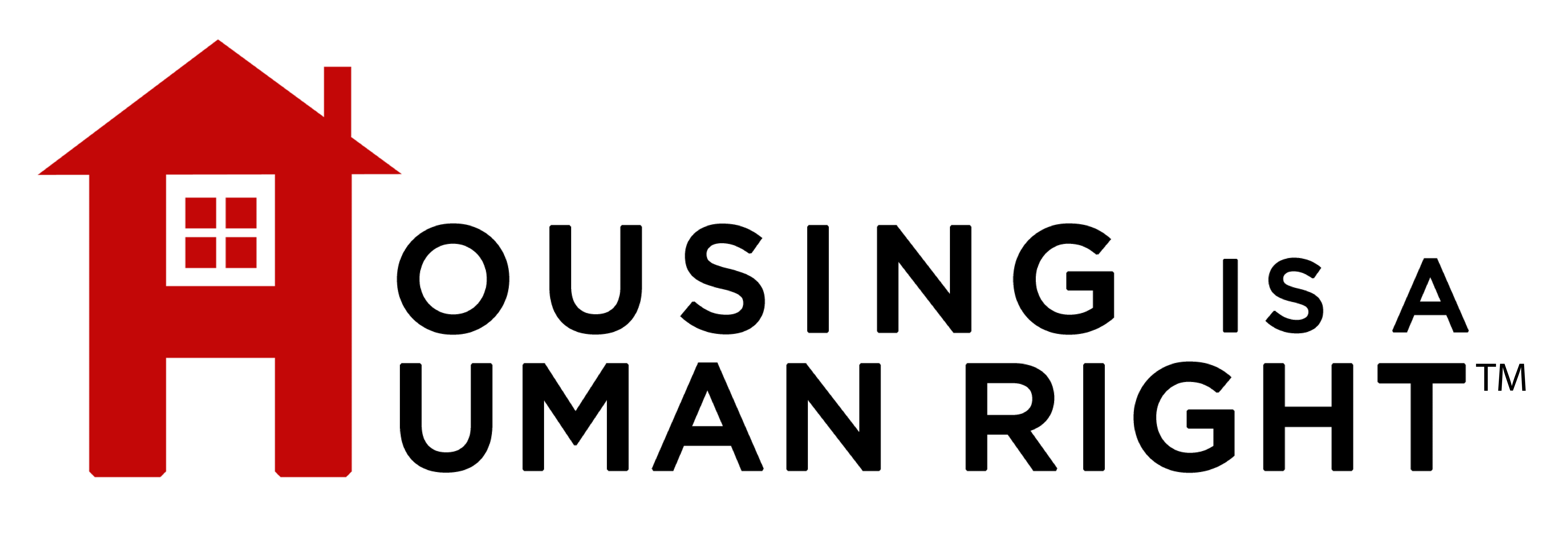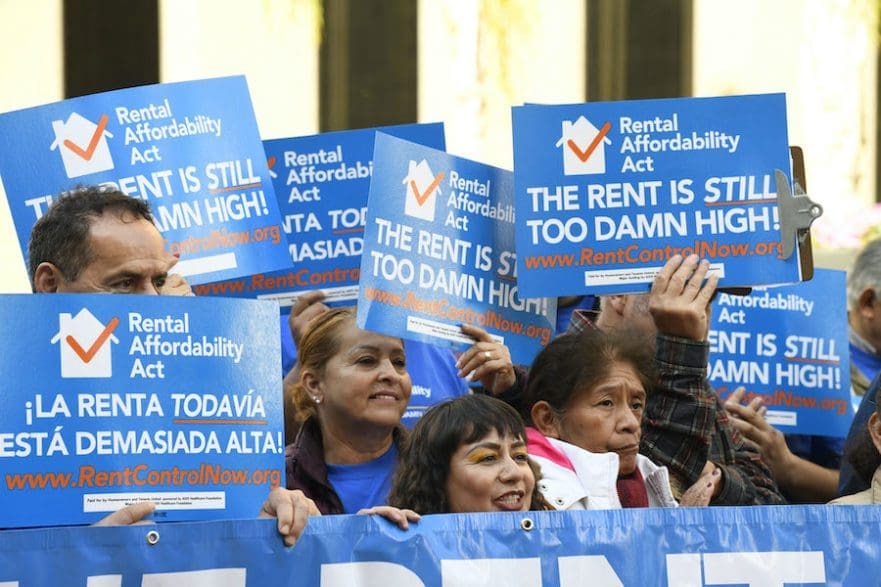The survival of American democracy displaced the ongoing COVID-19 pandemic and California’s wildfires as the center of addictive attention in the weeks just before and after the 2020 Election. Fights over local races and ballot initiatives were largely left up to whoever dominated the airwaves, which, as usual, meant that many California elections were won by whoever had the most money. That’s what happened to Proposition 21, the Rental Affordability Act, which was rejected by voters confused by the lies bought by billionaires spewed across multiple media platforms.
But victory by Big Real Estate does not erase the fact that the disastrous coronavirus is continuing unabated. The Los Angeles Times reported 958,214 confirmed cases and 17,871 deaths as of Nov. 6 — and the most vulnerable still face eviction and homelessness at the end of January, which Prop 21 could have mitigated.
Prop 21 was the statewide ballot measure that put limits on unfair, sky-high rent increases, reined in corporate landlord greed, and would have prevented homelessness. Top experts at USC, UCLA, and UC Berkeley agree that sensible rent limits are key for stabilizing California’s housing affordability crisis. That’s why Reps. Maxine Waters, Karen Bass and Barbara Lee, the California Democratic Party, the ACLU, the California Nurses Association, the California Alliance for Retired Americans, Black Lives Matter – L.A., the Los Angeles Times, and a slew of LGBTQ organizations and individuals — including LA City Councilmember Mike Bonin and LA Unified School Board member Jackie Goldberg — threw their full support behind Prop 21.
Prop 21 supporter Chris Goring, a former lieutenant colonel in the Army who is now an orthopedic surgeon based in Pasadena, is acutely mindful of the inequity intersection between housing and healthcare.
“I have had more than one patient who has said during this time of COVID: ‘I have been notified that I will possibly lose my apartment. I don’t have a job because we can’t go back to work in the particular industry that I am in.’ And if the landlord has a creditor, they’re not going to think, ‘Hey, let me give you some extra time.’ And I am finding patients that are running into that,” Goring said.
“If you’re in a setting where you’re living on a limited income and you’re just barely making ends meet, it’s somewhat unconscionable that someone could say, ‘Okay, there is no limit to my ability to increase your rent and I can do it just because it’s legal for me to do it.’ I think there’s a bit of an inhumane thought process there,” Goring said. “You have to be able to have some humane behavior in terms of how you address things. Money should not always be the thing that wins the day.”
But too often, money wins. Brisa Toscano, whose husband is active duty military in San Diego, supported Prop 21 because she is pregnant, asthmatic, and trapped in moldy military housing infested with brown spiders because they can’t afford anywhere else to live.
Toscano and her husband rely on a military rental allowance and, because of a lack of area housing affordability, they have been forced to use housing provided by a private real estate and development group – Lincoln Military Housing, which is “certified” by the military.
“We have mold issues. And like, you just move in and they tell you that the carpet is brand new. But it’s not brand new,” Toscano said.
“And me with my asthma — I shouldn’t have carpet because of all the dust and everything that like the carpet gets. We asked Military Housing if they could remove it and they told us, ‘Oh, yes, we can remove it — if you pay us $1,000.’” And, she added, “If the sliding door has a scratch, they’ll charge you for the whole door. That is like $800.”
Complaints brought public retaliation that chilled complaints by others. “A lot of people have been complaining, but they don’t do anything. In fact, one person went to the news and protested about it,” Toscano said, suggesting Lincoln Military Housing retaliated. “They asked them to leave. They gave them like a 30-day notice to get out of the house.”
Toscano’s husband is expected to be deployed overseas soon, but because of her health issues the military will not let her accompany him. So instead of finding a new safe affordable home that passage of Prop 21 might have provided, Toscano is facing a COVID winter with a newborn in a small moldy two-bedroom house infested with brown spiders.
Also facing a literal existential threat with the coming eviction tsunami are many in the LGBTQ community, especially transgender individuals.
“A few years ago, the Williams Institute put out a report that there are about 218,400 trans-identified individuals in the state of California,” of the 1,397,150 self-identified trans adults in America. “Obviously we, as all people, need to have a place to live. But there are many trans people who continue to be discriminated against simply because we are trans. Obviously, having some type of protection while trying to access housing or trying to maintain their housing is important to better the quality of life for our people,” said Bamby Salcedo, founder and director of the TransLatin@ Coalition.
More LGBTQ individuals live on the economic edge than is generally known. As the Williams Institute reported last April, “LGBT people are more likely than non-LGBT people to be poor, to be renters, to have unstable housing, and to be homeless. Furthermore, LGBT elders are more likely to live alone than non-LGBT elders; LGBTQ youth have high rates of homelessness related, for many, to rejection from their families; and discrimination against LGBT adults in housing and homeless shelters is widespread.”
Trans women also have the highest incidence of HIV infections than any other population and many trans people were not able to receive government relief because they were unemployed as a result of persistent discrimination and could not receive unemployment benefits. And those who were employed lost their jobs,” said Salcedo. “So there needs to be protections for trans people to not be homeless and to continue to maintain their places of living. And Prop 21 is one of those securities.”
That coming eviction tsunami that Prop 21 would have helped curtail is already here, according to Phil Rapier, a tenants attorney in Oakland.
“I can’t take it anymore,” Rapier said in explaining the urgency of passing Prop 21.
“In the last few years, I’ve had more and more calls from seniors who are being evicted. After 25 years of defending tenants in eviction cases, I’ve just gotten to the point where I can’t stand it because I have people calling me like the lady who was almost 90. She lived in her apartment for 44 years. Overseas investors bought the property and immediately tried to evict her. Why? Not because she didn’t pay her rent, but because they said she was hanging her laundry on the balcony and because she was feeding stray cats. Of course, they didn’t say it’s because her rent was $600 lower than everybody else’s in the building.”
Rapier is near despair. “We have to take care of our seniors. Other societies do,” he said. “It’s not that we can’t do it. We’ve been trained to think there’s nothing we can do: ‘It’s the real estate market. It’s the way it is.’ No, it’s not. We can change it.”
Karen Ocamb, the author of this article, is an award-winning journalist.

